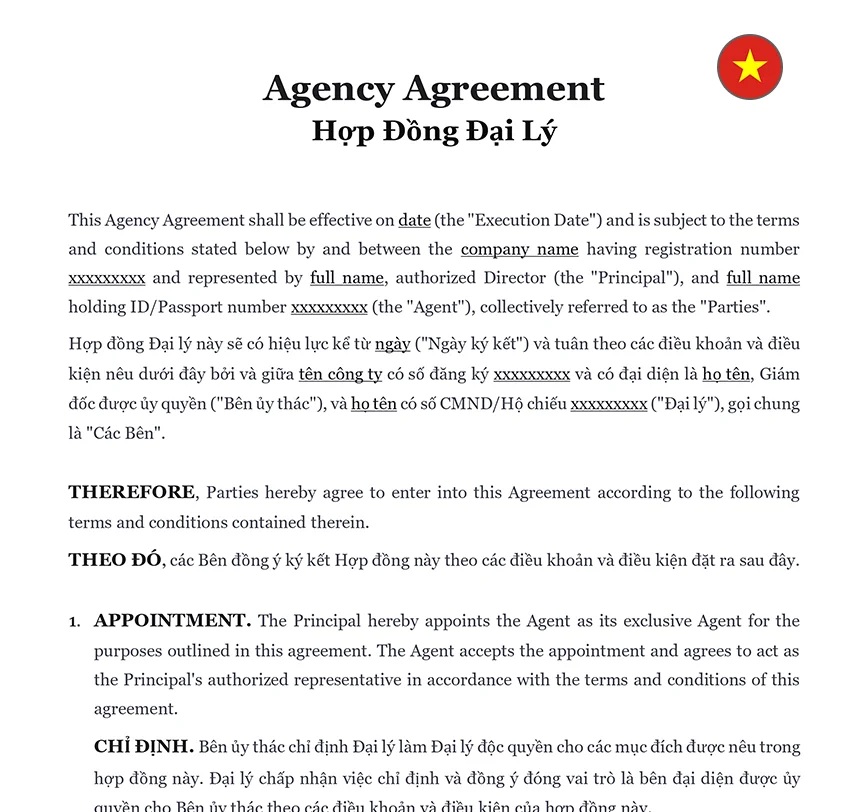Ready to use legal template
Drafted by experienced lawyers
Vietnamese-English translation
Ready to use legal template
Drafted by lawyers
Vietnamese-English translation
Home › Business contracts › Agency Agreement
Learn more about Agency Agreement in Vietnam
An Agency Agreement is a legal document that outlines the relationship between a principal (the entity or individual delegating authority) and an agent (the person or entity acting on behalf of the principal). It specifies the rights and responsibilities of both parties regarding the scope of work, duties, and compensation. Our Agency Agreement template is meticulously crafted by legal experts to comply with Vietnamese laws and regulations. It is provided in an easy-to-edit Word format, ensuring that users can tailor the agreement to their specific needs while maintaining legal compliance.
Table of contents
What is an Agency Agreement?
What is included in an Agency Agreement?
What are the benefits of using an Agency Agreement?
What are the legal requirements or regulations in Vietnam?
Can one agent work for multiple principals in Vietnam?
What is the difference between an agent and a principal?
How can I terminate an Agency Agreement in Vietnam?
What if there's a disagreement in an Agency Agreement?
What is an Agency Agreement?
An Agency Agreement is a contractual arrangement between two parties, the agent and the principal, where the agent agrees to act on behalf of the principal in certain matters. This agreement establishes the scope of the agent’s authority and the duties they are expected to perform. It also outlines the responsibilities of the principal, such as providing the necessary resources for the agent to carry out their tasks.
The agreement typically includes details such as the duration of the agency relationship, the specific tasks the agent is authorized to perform, the compensation the agent will receive, and any limitations on the agent’s authority. It is an essential legal document that helps clarify the rights and obligations of both parties, ensuring that the agency relationship is conducted in a transparent and mutually beneficial manner.
What is included in an Agency Agreement?
An Agency Agreement typically includes several key components:
Identification of Parties:
The agreement should clearly identify the agent (the party acting on behalf of the principal) and the principal (the party delegating authority to the agent).
Scope of Authority:
This section outlines the specific tasks and responsibilities the agent is authorized to perform on behalf of the principal.
Duration of Agreement:
The agreement specifies the duration of the agency relationship, including the start date and, if applicable, the end date.
Compensation:
Details regarding the agent’s compensation, such as commission rates, payment terms, and any additional expenses the principal agrees to reimburse.
Confidentiality:
Provisions outlining the agent’s obligation to maintain the confidentiality of the principal’s information and business dealings.
Termination Clause:
Specifies the conditions under which either party can terminate the agreement and the notice period required.
Indemnification:
Specifies which party is responsible for any losses, damages, or liabilities that may arise during the course of the agency relationship.
Non-Compete Clause:
May include restrictions on the agent from engaging in similar business activities that would compete with the principal during or after the agency relationship.
Dispute Resolution:
Specifies the method for resolving disputes that may arise between the parties, such as through mediation, arbitration, or litigation.
What are the benefits of using an Agency Agreement?
Using an Agency Agreement offers several benefits for both the principal and the agent:
| ➤ Clarity and Understanding: The agreement clearly defines the roles, responsibilities, and expectations of both parties, reducing the likelihood of misunderstandings or disputes. |
| ➤ Legal Protection: It provides legal protection by outlining the terms of the relationship, including compensation, termination procedures, and confidentiality obligations. |
| ➤ Efficiency: The agreement can help streamline the working relationship by specifying the scope of authority and tasks the agent is authorized to perform. |
| ➤ Specialization: Allows the principal to benefit from the specialized skills, knowledge, and resources of the agent in a particular field or market. |
| ➤ Cost-Effectiveness: For the principal, using an agent under an agreement can be more cost-effective than hiring full-time employees for certain tasks or projects. |
| ➤ Flexibility: It provides flexibility to the principal, as they can engage agents for specific projects or tasks without the long-term commitment of hiring permanent staff. |
| ➤ Market Expansion: For the agent, entering into an agency agreement can provide opportunities to expand their market reach by representing the principal's products or services in new territories. |




